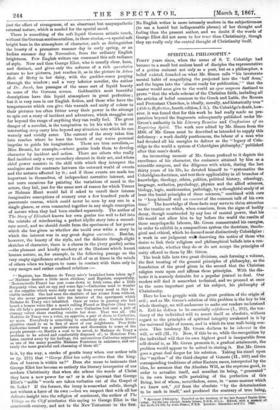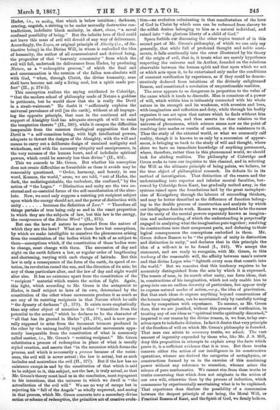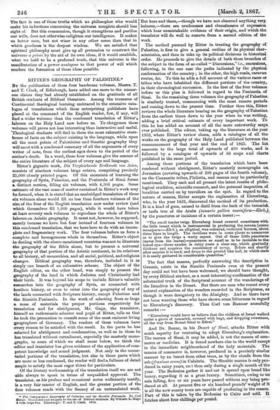SPIRFIUAL PHILOSOPHY.* FORTY years since, when the name of S.
T. Coleridge had become to a small but zealous band of disciples the representative of a genius eminent not only as a poet, but as a philosopher, a belief existed, founded on what Mr. Simon calls "his inveterate mental habit of magnifying the projected into the half done,' and the begun into the almost ready for publication,' " that the master would soon give to the world an opus magnum destined to prove " that the whole scheme of the Christian faith, including all the articles of belief common to the Greek and Latin, the Roman and Protestant Churches, is ideally, morally, and historically true" (Aids to Reflection, fourth edition, I. On Coleridge's death, how- ever, it was found that for this work he had really made no pre- paration beyond the fragments subsequently published under Mr. Green's authority in his Literary Remains and Confessions of an Enquiring Spirit. The work now edited by Mr. Simon from the MSS. of Mr. Green must be described as intended to supply this deficiency : a work doubly posthumous, the labour of a man who had devoted all his energies to deliver as the " legacy of Cole- ridge to the world a system of Coleridgian philosophy," published after that man's death.
An interesting memoir of Mr. Green prefixed to it depicts the excellence of his character, the eminence attained by him as .a scientific surgeon, and the diligence with which, during the last thirty years of his life, he devoted himself to " systematize the Coleridgian doctrines, and test their applicability in all branches of knowledge, theology, ethics, politics, political history, ethnology, language, aesthetics, psychology, physics and the allied sciences, biology, logic, mathematics, pathology, by a thoughtful study of at least the basial principles of these sciences," combined with care to "keep himself well an courant of the common talk of his own time." The knowledge of these facts may serve to claim attention to the treatise on which, when conscious, from the signs of bodily decay, though unattended by any loss of mental power, that his life would not allow him to lay before the world the results of these encyclopaedic labours, Mr. Green concentrated his energies, in order to exhibit in a compendious system the doctrines, theolo- gical and ethical, which he deemed most distinctively Coleridgian : a work in our judgment we deserving the notice of those who desire to link their religious and philosophical beliefs into a con- sistent whole, whether they-do or do not accept the principles of unity offered to them by Mr. Green.
The book falls into two great divisions, each forming a volume, the first treating of the general principles of philosophy, as the foundation of the proof given in the second that the Christian religion rests upon and affirms these principles. With the dia- lectic it is scarcely desirable for a popular journal to deal. Our readers will find it somewhat technical, and we proceed at once to the more important part of his subject, his philosophy of Christianity.
Here he has to grapple with the great problem of the origin of evil ; and as Mr. Green's solution of this problem is the key to his whole theology, we will endeavour to make our readers understand it. Evil he defines to be essentially selfishness (L, 292), the ten- dency of the individual will to assert itself as absolute, without regard to the principles of spiritual integrity awakened in it by the universal light of reason, and in which its true well-behig con- sists. This tendency Mr. Green declares to be inherent in the will, as will (II., 9). Now, if this be so, while the recognition by the individual will that its own highest good is inseparable from self-denial is, as Mr. Green presents it, a gradual attainment, the problem would appear to be solved in stating it. But Mr. Green goes a great deal deeper for his solution. Taking his stand upon the " naythos " of the third chapter of Genesis (II., 369) and the corresponding traditions of other Eastern races, interpreted by the idea, he assumes that the Absolute Will, as the supreme good, in order to actualize itself, and manifest its being, " generated " in its own image wills partaking of the perfection of this Being, but of whom, nevertheless, some, in "some manner which we know not," fell from the absolute "by the determination to be each in itself," and produced the contrary of true being, • Bpiritnal. Philosophy. Founded on the teaching of the late Samuel Taylor Cole- ridge. Bi the late Joseph Henry Green, F.R.S., D.C.L. Edited, with a' memoir of the Authcr's life, by John Simon, F.11.8. London: Macmillan and Co. 1808.
Hades, i.e., re ctEr5E;, that which is below intuition ; darkness, craving, anguish, a striving to be under mutually destructive con- tradictions, indefinite blank multeity, in short, chaos, " a moral confused possibility of being." But the infinite love of God could not leave this mass of evil will devoid of any way of deliverance. Accordingly, the Logos, or original principle of Alterity (i.e., of dis- tinctive being) in the Divine Will, in whom is embodied the idea of humanity, the author of all communicated and derived being, the progenitor of that " heavenly community " from which the evil will fell, undertook its deliverance from Hades, by producing Nature, as a " redemptive process," of which the final end and consummation is the reunion of the fallen non-absolute will with God, " when, through Christ, the divine humanity, man . shall have become not only a living soul, but a spirit made per- fect" (H., p. 374-5).
This conception realizes the saying attributed to Coleridge, "that the modern school of philosophy made of Nature a goddess in petticoats, but he would show that she is really the Devil in a strait-waistcoat." No doubt it " sufficiently explains the universal prevalence of evil [on the earth], without at all impugn- ing the opposite principle, that man in the continual aid and support of Almighty God has adequate strength of will to resist the temptation thereto " (II., 389), while it escapes the difficulties inseparable from the common theological supposition that the Devil is "a self-conscious being, with high intellectual powers, adequate to thwart the designs of the Almighty, with the will and means to carry out a deliberate design of unmixed malignity and wickedness, and with the necessary ubiquity and omnipresence, in the very recesses of the human heart, and of indefinite spiritual powers, which could be scarcely less than divine " (II., 402).
This we concede to Mr. Green. But whether his conception does not create difficulties as formidable as those it avoids may be reasonably questioned. " Order, harmony, and beauty, in one word, Kosmos, the world," arose, we are told, " out of Hades, the dark, the undistinguishable, the 'turbulent, the confused," by the action of " the Logos." "Distinction and unity are the two co- eternal and co-essential forms of the self-manifestation of the abso- lute. Now, we need only suppose a resisting yet recipient subject upon which the energy should act, and the power of distinction with unity becomes the definition of Law." " Therefore all things partake of true being only as and in the exact proportion in which they are the subjects of law, but this law is the energy, the omnipresence of the Divine Word" (II., 375).
But can the laws of nature be separated from the nature of which they are the laws? What are these laws but conceptions, by which we make intelligible to ourselves the phenomena arising from the constitution of the bodies which *e talk of as subject to them—conceptions which, if the constitution of these bodies were to change, must change with them. The succession of day and night on the earth follows a law, or regular order of lengthening and shortening, varying with each change of latitude. But this law is only a consequence of the form of the earth, its speed of ro- tation, its revolution round the sun, and the direction of its axis; let any of these particulars alter, and the law of day and night would alter also. It has no existence apart from the constitution of the " recipient" material which resists the action of light. Again, this light, which according to Mr. Green is the antagonist to Hades, is itself subject to laws of its own, determined by the constitution of the ether whose movements produce it as much as are any of its resisting recipients in that Nature which he calls " the dynasty of darkness" (I., 379). It exists more emphatically than any other object of sensation in that " transition from the potential to the actual," which he declares to be the character of "all that has its ground in Hades" (II., 376), and is now gene- rally supposed to arise from the incessant tremors produced in the ether by the unimag inably rapid molecular movements appa- rently inseparable from the constitution of what is commonly called matter, i.e., Mr. Green's " resisting recipient." Mr. Green substitutes a process of redemption in place of what is usually styled creation, and asserts that "in the ascension which forms the process, and which is necessarily a process because of the resist- ance, the evil will is never actual ; the law is actual, but as such includes and neutralizes the evil (II., 377). But if the law has no existence except-in and by the constitution of that which is said to be subject to it, this subject, not the law, is truly actual, so that Mr. Green's theory must land us in the conclusion, most repugnant to his intentions, that the universe in, which we dwell is "the actualization of the evil will." We see no way of escape but in rejecting his " fall of the Angels" as wholly unproved, and seeing in that process, which Mr. Green converts into a secondary divine action or scheme of redemption, the primitive act of creative evolu-
tion—an evolution culminating in that manifestation of the love. of God in Christ by which man can be redeemed from slavery to• the selfish desires belonging to him as a natural individual, and raised into " the glorious liberty of a child of God."
Space forbids our discussing the other topics treated of in this second part of Mr. Green's philosophy, of which we can only say generally, that while full of profound thought and noble senti- ments, it falls continually into the error illustrated by his theory of the origin of evil, that is, it treats what are merely hypotheses. respecting the universe and its Author, founded on the relation& observable between the human spirit and that upon which we act or which acts upon it, to be entertained only under the conditions of constant verification by experience, as if they could be demon- stratively deduced from intuitions of the divinely enlightened' Reason, and constituted a revelation of unquestionatile realities.
The error appears to us dangerous in proportion to the value4of the cause which it tends to discredit. Man is conscious of a power of will, which within him is intimately connected with his whole nature in its strength and its weakness, with aversion and love, with imagination and reflection and duty, while through his bodily- organism it can act upon that nature which he finds without hint- by producing motion, and thus asserts its close relation to the universe of phenomena, which science seems now on the point of resolving into modes or results of motion, or the resistance to it. Thus the study of the external world, or what we commonly cal? reality, though it is known to us only by a succession of appear- ances, is bringing us back to the study of will and thought, where alone we have an immediate knowledge of anything permanent, where, therefore, rather than in this phenomenal world, we should look for abiding realities. The philosophy of Coleridge and Green seeks to turn our inquiries to this channel, and in selecting the Will as the ultimate principle of being points, we believe, to the true object of philosophical research. Its defects lie in its method of investigation. That distinction of the reason and the understanding into superior and inferior mental faculties, bor- rowed by Coleridge from Kant, has gradually melted away, in the systems raised upon the foundations laid by the great metaphysi- cian of Konigsberg through the labours of succeeding thinkers,. and may be better described as the difference of function belong- ing to the double process of construction and analysis by which our intelligence does its work. Reason we apprehend to be the name. for the unity of the mental powers separately known as imagina- tion and understanding, of which the understanding is perpetually engaged in analyzing what the imagination puts together; resolving- its constructions into their component parts, and deducing to their logical consequences the conceptions embodied in them. Mr. Green defines Reason to be "the principle of unity in distinction and distinction in unity," and declares that in this principle the idea of a will-act is to be found (I., 243). We accept the statement, and are ready to recognize, with Mr. Green, in this tendency of the reasonable will, the affinity between man's nature and that divine Logos who " lighteth every man that cometh into• the world." But we conceive that this tendency requires to be- accurately distinguished from the acts by which it is expressed. The reason of man, in its search after unity, can form ideas, that is, constructions of his imagination, which not only enable him to- grasp into one an endless diversity of particulars, but appear truly- to express natural modes of action,—e.g., the idea of gravitation. But that such ideas do express anything beyond constructions of the human imagination, can be ascertained only by carefully testing them by comparison with experience. To assume, as Mr. Green does, that we are justified, without this process of verification, in treating any of our ideas as "spiritual truths spiritually discerned," imparted to our reaaon by the divine reason, is, we fear, to lay our- selves open to indefinite delusion. In fact it denies that very principle of the freedom of will on which Mr. Green's philosophy is founded.. That man can attain to necessary truths, we admit. The vast amount of ingenuity expended by those who, like Mr. J. S. Mill, deny this proposition in attempts to explain away the facts which• prove it, is a sufficient evidence that it is true. But these truths, concern either the action of our intelligence in its constructive operations, whence are derived the categories of metaphysics, or constructions formed by us in the exercise of this combining power without any reference to sensation, whence arises the science of pure mathematics. We cannot rise from these truths to truths concerning that which does not originate in the action of our own will, otherwise than by the process of induction, which commences by experimentally ascertaining what is to be explained. That experience does disclose the possibility of a communion between the deepest principle of our being, the Moral Will, or Practical Reason of Kant, and the Spirit of God, we firmly believe. The fact is one of those truths which no philosopher. who would make his inductions concerning the universe complete should lose sight of. But this communion, though it strengthens and purifies our wills, does not otherwise enlighten our intelligence. It makes us better men, but not wiser in any other sense than that in which goodness is the deepest wisdom. We are satisfied that spiritual philosophy must give up all pretension to construct the universe a priori by the aid of its own ideas, if it would establish, what we hold to be a profound truth, that this universe is the manifestation of a power analogous to that power of will which renders the formation of these ideas possible.
































 Previous page
Previous page